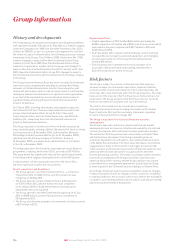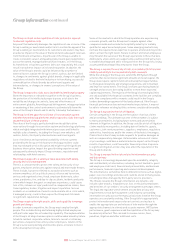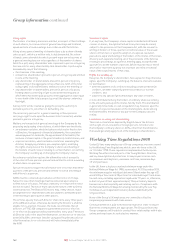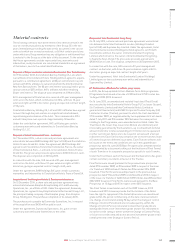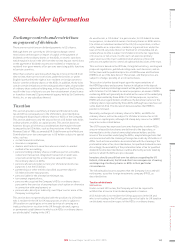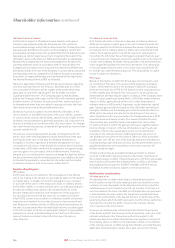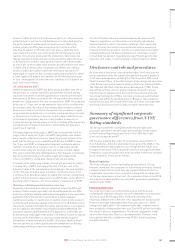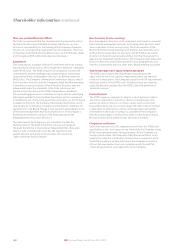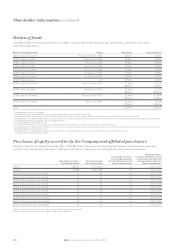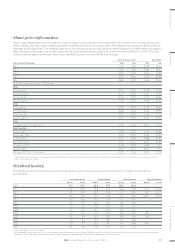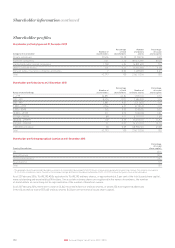Holiday Inn 2015 Annual Report Download - page 168
Download and view the complete annual report
Please find page 168 of the 2015 Holiday Inn annual report below. You can navigate through the pages in the report by either clicking on the pages listed below, or by using the keyword search tool below to find specific information within the annual report.Shareholder information continued
US federal income taxation
A US holder is subject to US federal income taxation on the gross
amount of any dividend paid by the Company out of its current or
accumulated earnings and profits (as determined for US federal income
tax purposes). Distributions in excess of the Company’s current and
accumulated earnings and profits, as determined for US federal income
tax purposes, will be treated as a return of capital to the extent of the
US holder’s basis in the shares or ADSs and thereafter as capital gain.
Because the Company has not historically maintained, and does not
currently maintain, books in accordance with US tax principles, the
Company does not expect to be in a position to determine whether any
distribution will be in excess of the Company’s current and accumulated
earnings and profits as computed for US federal income tax purposes.
As a result, it is expected that amounts distributed will be reported to
the Internal Revenue Service (IRS) as dividends.
Subject to applicable limitations and the discussion above regarding
concerns expressed by the US Treasury, dividends paid to certain
non-corporate US holders will be taxable at the preferential rates
applicable to long-term capital gain if the dividends constitute
‘qualified dividend income’. The Company expects that dividends
paid by the Company with respect to the ADSs will constitute qualified
dividend income. US holders should consult their own tax advisors
to determine whether they are subject to any special rules that limit
their ability to be taxed at these preferential rates.
Dividends must be included in income when the US holder, in the
case of shares, or the ADR Depositary, in the case of ADSs, actually
or constructively receives the dividend, and will not be eligible for the
dividends-received deduction generally allowed to US corporations in
respect of dividends received from other US corporations. For foreign
tax credit limitation purposes, dividends will generally be income from
sources outside the US.
The amount of any dividend paid in pounds sterling will be the US
dollar value of the sterling payments made, determined at the spot
sterling/US dollar rate on the date the dividend distribution is
includible in income, regardless of whether the payment is in fact
converted into US dollars. If the dividend is converted into US dollars
on that date, a US holder should not be required to recognise foreign
currency gain or loss in respect of the dividend income. Generally,
any gain or loss resulting from currency exchange fluctuations during
the period from the date the dividend payment is includible in income
to the date the payment is converted into US dollars will be treated
as ordinary income or loss from sources within the US.
Taxation of capital gains
UK taxation
A US holder who is not resident for UK tax purposes in the UK and
who is not trading in the UK will not generally be liable for UK taxation
on capital gains, or eligible for relief for allowable losses, realised
or accrued on the sale or other disposal of ADSs or ordinary shares.
A US holder of ADSs or ordinary shares who is an individual and who,
broadly, has temporarily ceased to be resident in the UK or has
become temporarily treated as non-resident for UK tax purposes
for a period of not more than five years (or, for departures before
6 April 2013, ceases to be resident or ordinarily resident or becomes
treated as non-resident for less than five years of assessment) and
who disposes of ordinary shares or ADSs during that period may, for
the year of assessment when that individual becomes resident again
in the UK, be liable to UK tax on capital gains (subject to any available
exemption or relief), notwithstanding the fact that such US holder
was not treated as resident in the UK at the time of the sale or
other disposal.
US federal income taxation
A US holder who sells or otherwise disposes of ordinary shares or
ADSs will recognise a capital gain or loss for US federal income tax
purposes equal to the difference between the amount realised and
its tax basis in the ordinary shares or ADSs, each determined in US
dollars. Such capital gain or loss will be long-term capital gain or
loss where the US holder has a holding period greater than one year.
Losses may also be treated as long-term capital losses to the extent of
certain ‘extraordinary dividends’ that qualified for the preferential tax
rates on qualified dividend income described above. The capital gain
or loss will generally be income or loss from sources within the US
for foreign tax credit limitation purposes. The deductibility of capital
losses is subject to limitations.
PFIC rules
Based on the manner in which the Group operates its business and
on estimates of the value of its assets (which estimates are based,
in part, on the market value of the Company’s ADSs) the Company
believes that it was not a PFIC for US federal income tax purposes for
its 2015 taxable year. However, this conclusion is an annual factual
determination and thus may be subject to change. If the Company were
a PFIC for any taxable year during which a US holder owned ordinary
shares or ADSs, gain realised on the sale or other disposition of
ordinary shares or ADSs would, in general, not be treated as capital
gain. Instead, gain would be treated as if the US holder had realised
such gain rateably over the holding period for the ordinary shares or
ADSs and, to the extent allocated to the taxable year of the sale or
other disposition and to any year before the Company became a PFIC,
would be taxed as ordinary income. The amount allocated to each
other taxable year would be taxed at the highest tax rate in effect
for each such year to which the gain was allocated, together with an
interest charge in respect of the tax attributable to each such year.
In addition, similar rules would apply to any ‘excess distribution’
received on the ordinary shares or ADSs (generally, the excess of
any distribution received on the ordinary shares or ADSs during the
taxable year over 125 per cent of the average amount of distributions
received during a specified prior period), and the preferential rates for
qualified dividend income received by certain non-corporate US
holders would not apply.
Certain elections may be available (including a market-to-market
election) to US holders that would result in alternative treatments of
the ordinary shares or ADSs. If the Company were a PFIC for any taxable
year in which a US holder held ordinary shares or ADSs, a US holder
would generally be required to file IRS Form 8621 with their annual
US federal income tax returns, subject to certain exceptions.
Additional tax considerations
UK inheritance tax
An individual who is neither domiciled nor deemed domiciled in
the UK (under certain UK rules relating to previous domicile or long
residence) is only chargeable to UK inheritance tax to the extent the
individual owns assets situated in the UK. As a matter of UK law, it is
not clear whether the situs of an ADS for UK inheritance tax purposes
is determined by the place where the depositary is established and
records the entitlements of the deposit holders, or by the situs of the
underlying share which the ADS represents, but the UK tax authorities
may take the view that the ADSs, as well as the ordinary shares,
are or represent UK-situs assets.
However, an individual who is domiciled in the US (for the purposes
of the Estate and Gift Tax Convention (the Convention), and is not a UK
national as defined in the Convention, will not be subject to UK
inheritance tax (to the extent UK inheritance tax applies) in respect of
the ordinary shares or ADSs on the individual’s death or on a transfer
of the ordinary shares or ADSs during their lifetime, provided that any
applicable US federal gift or estate tax is paid, unless the ordinary
166 IHG Annual Report and Form 20-F 2015


